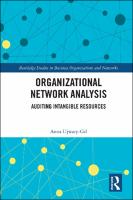Abstract
The integrated meta-model for organizational resource audit is a consistent and comprehensive instrument for auditing intangible resources and their relations and associations from the network perspective. This book undertakes a critically important problem of management sciences, poorly recognized in literature although determining the current and future competitiveness of enterprises, sectors and economies. The author notes the need to introduce a theoretical input, which is manifested by the meta-model. An expression of this treatment is the inclusion of the network as a structure of activities, further knowledge as an activity, and intangible assets as intellectual capital characterized by a structure of connections. The case study presented is an illustration of the use of network analysis tools and other instruments to identify not only the most important resources, tasks or actors, as well as their effectiveness, but also to connect the identified networks with each other. The author opens the field for applying her methodology, revealing the structural and dynamic features of the intangible resources of the organization. The novelty of the proposed meta-model shows the way to in-depth applications of network analysis techniques in an intra-organizational environment. Organizational Network Analysis makes a significant contribution to the development of management sciences, in terms of strategic management and more strictly resource approach to the company through structural definition of knowledge; application of the concept of improvement-oriented audit abandoning a narrow understanding of this technique in terms of compliance; reliable presentation of audits available in the literature; rigorous reasoning leading to the development of a meta-model; close linking of knowledge and resources with the strategy at the design stage of the developed audit model, including the analysis of link dynamics and networks together with an extensive metrics proposal; an interesting illustration of the application with the use of metrics, tables and charts. It will be of value to researchers, academics, managers, and students in the fields of strategic management, organizational studies, social network analysis in management, knowledge management, and auditing knowledge resources in organizations.
Classification
Organizational theory and behaviour
Business strategy


 Download
Download
